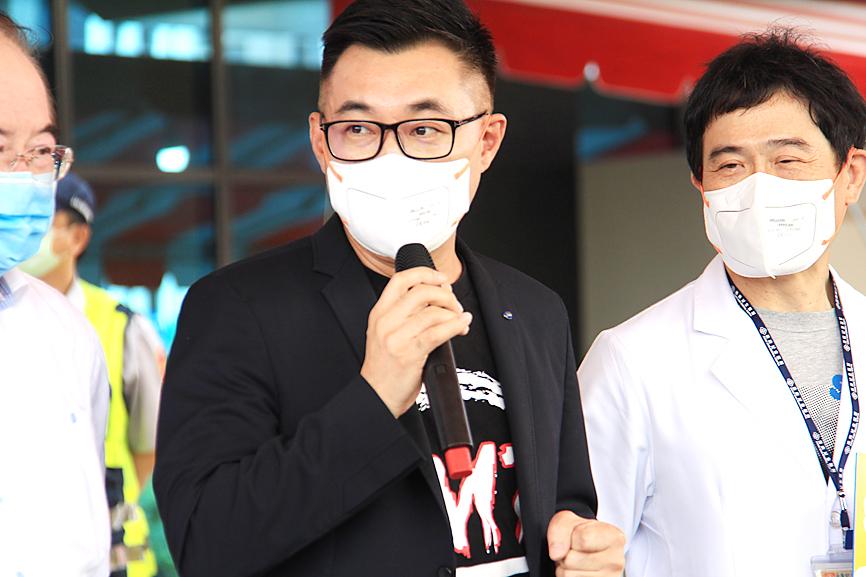The Chinese Nationalist Party (KMT) has not abandoned the idea of peace across the Taiwan Strait, KMT Chairman Johnny Chiang (江啟臣) said yesterday, after former Changhua County commissioner Cho Po-yuan (卓伯源) said that the party’s leadership had discarded the “foundation for cross-strait peace.”
The KMT’s leadership “threw away the foundation for cross-strait peace, the 1992 consensus,” Cho said in a five-minute video posted online on Sunday, in which he announced his intent to run for party chairperson in the upcoming election.
The so-called “1992 consensus,” a term former Mainland Affairs Council chairman Su Chi (蘇起) in 2006 admitted making up in 2000, refers to a tacit understanding between the KMT and the Chinese government that both sides of the Strait acknowledge there is “one China,” with each side having its own interpretation of what “China” means.

Photo: Chiu Shu-yu, Taipei Times
Asked yesterday for comment on the sidelines of donating medical supplies to Tucheng Hospital in New Taipei City, Chiang said that some of what Cho expressed on Sunday coincided with what he had presented at the KMT National Congress in September last year.
Chiang said that he made the KMT’s discourse on cross-strait relations “very clear” at the congress.
The party advocates “a 1992 consensus based on the Constitution of the Republic of China,” Chiang added.
“On the one hand, we emphasize the subjectivity of the Republic of China,” he said. “On the other, we emphasize the importance of the 1992 consensus, of having one China with different interpretations (一中各表) and of seeking common ground while reserving differences (求同存異).”
“There is no such thing as the party abandoning the idea of cross-strait peace,” Chiang said.
Regarding plans for this year’s KMT chairperson election, Chiang said the party’s Central Standing Committee decided to discuss a timeline for the election once the Central Epidemic Command Center lowered the nationwide COVID-19 alert from level 3 to level 2.
A nationwide level 3 pandemic alert issued on May 19 is scheduled to continue through July 26.
Elections for the KMT chairperson and delegates to the party’s 21st national congress had been scheduled to take place on Saturday next week.
At a May 26 meeting, the KMT Central Standing Committee postponed the elections given the COVID-19 situation.
Cho’s announcement made him the fourth candidate to run for KMT chairperson.
On Feb. 20, Chiang announced that he would seek to be re-elected. He won the KMT’s chairperson by-election on March 7 last year and was sworn in two days later.
Additional reporting by CNA

Taiwanese scientists have engineered plants that can capture about 50 percent more carbon dioxide and produce more than twice as many seeds as unmodified plants, a breakthrough they hope could one day help mitigate global warming and grow more food staples such as rice. If applied to major food crops, the new system could cut carbon emissions and raise yields “without additional equipment or labor costs,” Academia Sinica researcher and lead author the study Lu Kuan-jen (呂冠箴) said. Academia Sinica president James Liao (廖俊智) said that as humans emit 9.6 billion tonnes of carbon dioxide compared with the 220 billion tonnes absorbed

The Taipei Mass Rapid Transit (MRT) Wanda-Zhonghe Line is 81.7 percent complete, with public opening targeted for the end of 2027, New Taipei City Mayor Hou You-yi (侯友宜) said today. Surrounding roads are to be open to the public by the end of next year, Hou said during an inspection of construction progress. The 9.5km line, featuring nine underground stations and one depot, is expected to connect Chiang Kai-shek Memorial Hall Station to Chukuang Station in New Taipei City’s Jhonghe District (中和). All 18 tunnels for the line are complete, while the main structures of the stations and depot are mostly finished, he

Taipei is to implement widespread road closures around Taipei 101 on Friday to make way for large crowds during the Double Ten National Day celebration, the Taipei Department of Transportation said. A four-minute fireworks display is to be launched from the skyscraper, along with a performance by 500 drones flying in formation above the nearby Nanshan A21 site, starting at 10pm. Vehicle restrictions would occur in phases, they said. From 5pm to 9pm, inner lanes of Songshou Road between Taipei City Hall and Taipei 101 are to be closed, with only the outer lanes remaining open. Between 9pm and 9:40pm, the section is

China’s plan to deploy a new hypersonic ballistic missile at a Chinese People’s Liberation Army Rocket Force (PLARF) base near Taiwan likely targets US airbases and ships in the western Pacific, but it would also present new threats to Taiwan, defense experts said. The New York Times — citing a US Department of Defense report from last year on China’s military power — on Monday reported in an article titled “The missiles threatening Taiwan” that China has stockpiled 3,500 missiles, 1.5 times more than four years earlier. Although it is unclear how many of those missiles were targeting Taiwan, the newspaper reported